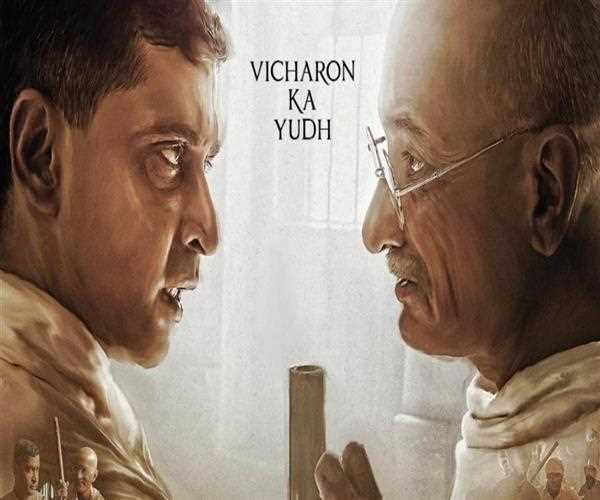
13-Jun-2024 , Updated on 6/13/2024 10:23:50 PM
In Search of Nathuram Godse: A Controversial Legacy
"An individual is never greater than a nation, Nana. But Gandhi has started considering himself greater than the nation."
The courtroom was charged with an electric tension as Nathuram Godse stood before the judge, a determined fire in his eyes. His voice, unwavering and firm, resonated through the hallowed halls as he began his five-hour defense, carefully articulated and meticulously prepared. The 112-page statement, a testament to his fervent beliefs, lay open on the wooden podium. Each chapter of his defense was a window into his mind, revealing the depth of his convictions and the bitterness that had festered within him.
Godse began by recounting his childhood, born into a Brahmin family in Pune, where nationalism ran in the very veins of society. He spoke of his early years, a time when he was a devoted follower of Mahatma Gandhi, deeply inspired by his vision of an independent India. The room listened in silence as Godse described his participation in the civil disobedience movement, a young idealist with dreams of a free nation.
But as he continued, his tone shifted, revealing the incidents that had transformed him from a follower to a vehement critic. The Jallianwala Bagh Massacre of 1919 was a turning point. General Dyer’s troops had mercilessly gunned down hundreds of unarmed Indians, an atrocity that left the nation in mourning. Godse’s voice tightened with anger as he spoke of Gandhi’s perceived lack of strong condemnation against Dyer, a disappointment that lingered in his heart.
The Moplah Rebellion of 1921 further deepened the chasm between Gandhi and Godse. Moplah Muslims in Kerala had committed unspeakable atrocities against Hindus, and Gandhi’s silence on the matter was a wound that never healed for Godse. He felt abandoned by the man he once revered, a sentiment that only grew stronger with time.
As Godse delved into Gandhi’s stance on Jammu and Kashmir, his voice was laced with bitterness. He recounted how Gandhi had advocated for Muslim leadership in Jammu, a predominantly Hindu region, while remaining silent about Hindu leadership in Hyderabad, a Hindu-majority region ruled by a Muslim king. To Godse, this inconsistency was a glaring betrayal, a sign that Gandhi’s policies were biased and harmful to Hindu interests.
The partition of India and Pakistan was the final straw. The agreement to pay Pakistan ₹75 crore was a contentious issue, especially after Pakistan’s attack on Kashmir in 1947. Sardar Vallabhbhai Patel’s decision to withhold the remaining ₹55 crore was a stand against aggression, but Gandhi’s insistence on honoring the agreement, even fasting to death for Hindu-Muslim unity, enraged Godse and his supporters. It was this unwavering stance that convinced Godse that Gandhi’s removal was necessary to save India.
On January 30, 1948, the fateful day arrived. Godse recounted the moment he pulled the trigger, his hand steady, his resolve unbroken. The courtroom held its breath as he described the scene, the shot that echoed through history, the assassination that shook a nation.
In the aftermath, the world condemned Godse’s actions, but he remained unrepentant. He believed that “Apart from this court, there was a higher court where his actions would be justified as a service to the nation”. It was a chilling conviction, one that left the room in a heavy silence.
Reflecting on the era, it was a time of tumult and uncertainty, where laws were fragile and avenues for dissent were limited. Godse felt driven to extreme measures, a belief that underscores the complexities of the historical period.
Today, society offers numerous channels for voicing dissent, from social media to a robust legal system. The swift legal action against YouTuber Gaurav John in a recent animal cruelty case exemplifies the modern avenues available to address grievances. Violence, as history has shown, is never the answer.
Yet, as the echoes of Godse’s words faded from the courtroom, the nation was left to grapple with the stark reality of Gandhi’s legacy. For all his virtues, Gandhi's actions and policies were not without their flaws. His decisions, seen through Godse’s eyes, were a series of missteps that had, in some ways, betrayed the very people he sought to protect. Gandhi's relentless pursuit of Hindu-Muslim unity, often at the expense of Hindu interests, and his perceived partiality in political matters had sown seeds of discord and resentment. In the end, the man who preached nonviolence and unity left behind a nation divided, his legacy forever tainted by the contradictions and failures that marked his approach to India's complex and multifaceted struggle for independence.

Student
I am a content writter !
Join Our Newsletter
Subscribe to our newsletter to receive emails about new views posts, releases and updates.
Copyright 2010 - 2026 MindStick Software Pvt. Ltd. All Rights Reserved Privacy Policy | Terms & Conditions | Cookie Policy